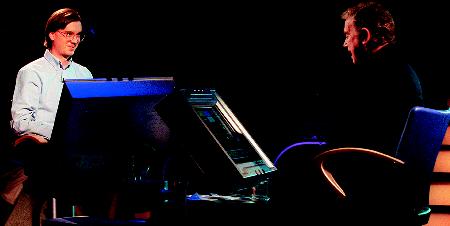In November 1999, I was a contestant on the hit TV game show “Who Wants To Be A Millionaire” (WWTBAM). Alas, I didn’t win $1,000,000, but I did pretty well and had a lot of fun.
But how likely was it that I could have won the million? Let’s explore the math behind the game!
Rules of the Game
The game on WWTBAM is a series of multiple-choice questions that each have four possible answers (A,B,C,D). The contestant must answer 15 of these questions correctly, one at a time, in order to win the million dollars. As soon as the contestant answers a question incorrectly, the game is over.
Your Turn in the Hot Seat
Let’s imagine you’re a contestant. Here are some questions for you to think about. You can stop reading and work through the questions at any time. We’ll be walking through the solutions in the next section!
1. Suppose you randomly guess at each of the 15 questions. What’s the probability that you win the million dollars?
2. The first five questions are pretty easy — they’re designed to help the contestant relax and get warmed up. (One of my first five questions when I was on the show was: “Which of the following instruments do you have to blow into to play? (A) Trumpet (B) Drum (C) Guitar (D) Triangle”.)
So, let’s assume you get those first five correct, and then randomly guess at the remaining 10. What’s the probability that you win the million dollars?
3. The next five questions (6–10) are harder, but are the sort of general-knowledge questions that people who know a lot of trivia often know.
So, let’s suppose you know the answers to the first 10 questions, and randomly guess at the final five. Now what’s the probability that you win the million dollars?
4. As above, let’s suppose you get the first 10. But for the final five questions, now let’s use more realistic assumptions that incorporate some other aspects of the game:
- One of the five questions will be right up your alley, and you’ll know the answer!
- On one of the questions, you use the 50/50 lifeline. That is, the host will eliminate two of the wrong answers for you, and you guess between the remaining two answers.
- On one of the questions, you use the Ask The Audience lifeline. That is, the host will poll the audience, and you’ll go with whatever answer wins the poll. Let’s assume that the audience is smart and comes up with the right answer 75% of the time.
- On one of the questions, you use the Phone A Friend lifeline — meaning, the host will let you call one of your friends to get help. Let’s assume your friend is smart and comes up with the right answer 50% of the time.
- On one of the questions, you’ll have to just randomly guess.
Now what’s the probability that you win the million dollars?

Is That Your Final Answer?
Ready to see the answers? Let’s talk through the solutions to these questions below.
1. Since there are four answer choices and only one of them is correct — and you’re randomly guessing — you have a 1-in-4 chance of getting any individual question correct. That is, the probability is 1/4 of answering a question correctly. But you have to do this 15 times! The probability of this occurring is:
How unlikely is this? We can use the fact that
and this is about 1000, so we have the approximation:
This is about a one-in-a-billion chance. That’s very, very, very unlikely. For instance, if you were able to play WWTBAM every 30 minutes, 24-hours-a-day, we’d expect it would take you about 57,000 years to win the million using this strategy! (Of course you can’t even try to do this in real life: Once you’ve played on WWTBAM, you’re ineligible to play again.)
2. If you know the first five questions, then you only have to guess right 10 times. So now the probability of winning is
which approximates as:
This is about a 1-in-1 million chance, which is still very, very unlikely. If you played WWTBAM every 30 minutes, 24-hours-a-day, it would “only” take you 57 years, on average, to win the million.
3. Now we’re cooking: Let’s say you know the answers to the first 10 questions, and you have to successfully guess only the remaining five. The probability of your success is now just
That’s roughly a 1-in-1000 chance!
It’s still very unlikely, but it wouldn’t be totally unheard of.
4. Using the more complicated assumptions on our final five questions, you’ll get them correct as follows:
- The question that you know: You’ll get it correct with probability one.
- The question that you used the 50/50 lifeline: You’ll get it correct with probability 1/2.
- The question where you asked the audience: You’ll get it correct with a probability of 3/4.
- The question that you used the Phone-A-Friend lifeline: You’ll get it correct with probability 1/2.
- The question that you guessed: You’ll get it correct with probability 1/4.
So, combining these, we see that the probability that you win the million dollars is …
Since 4.6875% is about 5% = 1/20, that means you have about a 1-in-20 chance of being a millionaire!
My "Who Wants to Be a Millionaire" Experience
In reality, I’ve oversimplified things greatly. For starters, WWTBAM contestants usually don’t know all of the first 10 questions, and therefore have to use some of their lifelines on questions 6–10.
I also left out an important part of the game: Contestants can decide to stop at any time, keeping the money they’ve already won. For most of the game, if a contestant answers a question incorrectly, not only does the game end, but they can lose some of the money they’ve already accumulated.
Here's what happened to me when I was on the show. I knew the first eight questions, no problem. But on question 9, I had to Ask the Audience. Fortunately they were right. (They usually are.) Next, on question 10, I used the 50/50, and then made an educated guess — and I was right!
On to question 11, which I happened to know. Only 4 questions away from being a millionaire!
Then came question 12, which I didn’t know. I used the Phone a Friend, but my friend didn’t know for sure either. So I decided to pass and end the game, and I went home with the $64,000 prize for answering 11 questions.
So if you’re ever on the show, and you’re determined to go for the million dollars, now you have some idea of the odds! In actuality, there have been about 3,400 episodes of WWTBAM in the U.S., and only 12 people have won the top prize (that's about .3%).
Note: The game format has changed from time to time over the years, so the calculations we did are certainly not representative of the show over all of its episodes.
Want to learn more about how to compute probabilities like this? I recommend the AoPS textbook Introduction to Counting & Probability, written by yours truly!
*Photo Credit: Maria Melin, copyright 1999 ABC Television











